Deck 16: Vector Calculus
سؤال
سؤال
سؤال
سؤال
سؤال
سؤال
سؤال
سؤال
سؤال
سؤال
سؤال
سؤال
سؤال
سؤال
سؤال
سؤال
سؤال
سؤال
سؤال
سؤال
سؤال
سؤال
سؤال
سؤال
سؤال
سؤال
سؤال
سؤال
سؤال
سؤال
سؤال
سؤال
سؤال
سؤال
سؤال
سؤال
سؤال
سؤال
سؤال
سؤال
سؤال
سؤال
سؤال
سؤال
سؤال
سؤال
سؤال
سؤال
سؤال
سؤال
سؤال
سؤال
سؤال
سؤال
سؤال
سؤال
سؤال
سؤال
سؤال
سؤال
سؤال
سؤال
سؤال
سؤال
سؤال
سؤال
سؤال
سؤال
سؤال
سؤال
سؤال
سؤال
سؤال
سؤال
سؤال
سؤال
سؤال
سؤال
سؤال
سؤال

فتح الحزمة
قم بالتسجيل لفتح البطاقات في هذه المجموعة!
Unlock Deck
Unlock Deck
1/137
العب
ملء الشاشة (f)
Deck 16: Vector Calculus
1
Use Stokes' Theorem to evaluate  .
.  ;
;
S is the part of the ellipsoid lying above the xy-plane and oriented with normal pointing upward.
lying above the xy-plane and oriented with normal pointing upward.
 .
.  ;
;S is the part of the ellipsoid
 lying above the xy-plane and oriented with normal pointing upward.
lying above the xy-plane and oriented with normal pointing upward.0
2
Use Stoke's theorem to calculate the surface integral  where
where  and S is the part of the cone
and S is the part of the cone 
 where
where  and S is the part of the cone
and S is the part of the cone 
0
3
Use Stoke's theorem to evaluate 
 C is the curve of intersection of the hyperbolic paraboloid
C is the curve of intersection of the hyperbolic paraboloid  and the cylinder
and the cylinder  oriented counterclockwise as viewed from above.
oriented counterclockwise as viewed from above.

 C is the curve of intersection of the hyperbolic paraboloid
C is the curve of intersection of the hyperbolic paraboloid  and the cylinder
and the cylinder  oriented counterclockwise as viewed from above.
oriented counterclockwise as viewed from above.
4
Use the Divergence Theorem to calculate the surface integral ; that is, calculate the flux of across . S is the surface of the box bounded by the coordinate planes and the planes .
A)
B)
C)
D)
E)
A)
B)
C)
D)
E)

فتح الحزمة
افتح القفل للوصول البطاقات البالغ عددها 137 في هذه المجموعة.
فتح الحزمة
k this deck
5
Use Stokes' Theorem to evaluate . ; C is the curve obtained by intersecting the cylinder with the hyperbolic paraboloid , oriented in a counterclockwise direction when viewed from above
A)
B) 0
C)
D)
A)
B) 0
C)
D)

فتح الحزمة
افتح القفل للوصول البطاقات البالغ عددها 137 في هذه المجموعة.
فتح الحزمة
k this deck
6
Use Stokes' Theorem to evaluate . ; S is the part of the paraboloid lying below the plane and oriented with normal pointing downward.
A) 0
B)
C)
D)
A) 0
B)
C)
D)

فتح الحزمة
افتح القفل للوصول البطاقات البالغ عددها 137 في هذه المجموعة.
فتح الحزمة
k this deck
7
Use Stokes' Theorem to evaluate  S consists of the top and the four sides (but not the bottom) of the cube with vertices
S consists of the top and the four sides (but not the bottom) of the cube with vertices  oriented outward.
oriented outward. 
 S consists of the top and the four sides (but not the bottom) of the cube with vertices
S consists of the top and the four sides (but not the bottom) of the cube with vertices  oriented outward.
oriented outward. 

فتح الحزمة
افتح القفل للوصول البطاقات البالغ عددها 137 في هذه المجموعة.
فتح الحزمة
k this deck
8
Use a computer algebra system to compute the flux of F across S. S is the surface of the cube cut from the first octant by the planes
A) 3
B) 4
C)
D) 0.67
E) 1
A) 3
B) 4
C)
D) 0.67
E) 1

فتح الحزمة
افتح القفل للوصول البطاقات البالغ عددها 137 في هذه المجموعة.
فتح الحزمة
k this deck
9
Evaluate the surface integral. S is the part of the plane that lies in the first octant.
A)
B)
C)
D)
E)
A)
B)
C)
D)
E)

فتح الحزمة
افتح القفل للوصول البطاقات البالغ عددها 137 في هذه المجموعة.
فتح الحزمة
k this deck
10
Use Stoke's theorem to evaluate 
 C is the curve of intersection of the plane z = x + 9 and the cylinder
C is the curve of intersection of the plane z = x + 9 and the cylinder 

 C is the curve of intersection of the plane z = x + 9 and the cylinder
C is the curve of intersection of the plane z = x + 9 and the cylinder 

فتح الحزمة
افتح القفل للوصول البطاقات البالغ عددها 137 في هذه المجموعة.
فتح الحزمة
k this deck
11
Use Stoke's theorem to evaluate 
 C is the boundary of the part of the paraboloid
C is the boundary of the part of the paraboloid  in the first octant. C is oriented counterclockwise as viewed from above.
in the first octant. C is oriented counterclockwise as viewed from above.

 C is the boundary of the part of the paraboloid
C is the boundary of the part of the paraboloid  in the first octant. C is oriented counterclockwise as viewed from above.
in the first octant. C is oriented counterclockwise as viewed from above.
فتح الحزمة
افتح القفل للوصول البطاقات البالغ عددها 137 في هذه المجموعة.
فتح الحزمة
k this deck
12
Evaluate the surface integral. Round your answer to four decimal places. S is surface
A)
B)
C)
D)
E)
A)
B)
C)
D)
E)

فتح الحزمة
افتح القفل للوصول البطاقات البالغ عددها 137 في هذه المجموعة.
فتح الحزمة
k this deck
13
Suppose that where g is a function of one variable such that . Evaluate where S is the sphere
A)
B)
C)
D)
E) None of these
A)
B)
C)
D)
E) None of these

فتح الحزمة
افتح القفل للوصول البطاقات البالغ عددها 137 في هذه المجموعة.
فتح الحزمة
k this deck
14
Use Stokes' Theorem to evaluate  .
.  ;
;
C is the boundary of the triangle with vertices ,
,  , and
, and  oriented in a counterclockwise direction when viewed from above
oriented in a counterclockwise direction when viewed from above
 .
.  ;
;C is the boundary of the triangle with vertices
 ,
,  , and
, and  oriented in a counterclockwise direction when viewed from above
oriented in a counterclockwise direction when viewed from above
فتح الحزمة
افتح القفل للوصول البطاقات البالغ عددها 137 في هذه المجموعة.
فتح الحزمة
k this deck
15
Assuming that S satisfies the conditions of the Divergence Theorem and the scalar functions and components of the vector fields have continuous second order partial derivatives, find , where a is the constant vector.
A) 6
B) 5
C) 7
D) 8
E) 3
A) 6
B) 5
C) 7
D) 8
E) 3

فتح الحزمة
افتح القفل للوصول البطاقات البالغ عددها 137 في هذه المجموعة.
فتح الحزمة
k this deck
16
Use Stokes' Theorem to evaluate S consists of the four sides of the pyramid with vertices (0, 0, 0), (3, 0, 0), (0, 0, 3), (3, 0,3) and (0, 3, 0) that lie to the right of the xz-plane, oriented in the direction of the positive y-axis.
A) 0
B) 12
C) 16
D) 49
E) 1
A) 0
B) 12
C) 16
D) 49
E) 1

فتح الحزمة
افتح القفل للوصول البطاقات البالغ عددها 137 في هذه المجموعة.
فتح الحزمة
k this deck
17
The temperature at the point in a substance with conductivity is Find the rate of heat flow inward across the cylindrical
A)
B)
C)
D)
E)
A)
B)
C)
D)
E)

فتح الحزمة
افتح القفل للوصول البطاقات البالغ عددها 137 في هذه المجموعة.
فتح الحزمة
k this deck
18
Use Stoke's theorem to evaluate where and C is the boundary of the part of the plane in the first octant.
A) 69
B) 16
C) 49
D) 0
E) 23
A) 69
B) 16
C) 49
D) 0
E) 23

فتح الحزمة
افتح القفل للوصول البطاقات البالغ عددها 137 في هذه المجموعة.
فتح الحزمة
k this deck
19
Find parametric equations for C, if C is the curve of intersection of the hyperbolic paraboloid  and the cylinder
and the cylinder  oriented counterclockwise as viewed from above.
oriented counterclockwise as viewed from above.
 and the cylinder
and the cylinder  oriented counterclockwise as viewed from above.
oriented counterclockwise as viewed from above.
فتح الحزمة
افتح القفل للوصول البطاقات البالغ عددها 137 في هذه المجموعة.
فتح الحزمة
k this deck
20
Evaluate . ; S is the part of the plane in the first octant.
A) 0
B)
C)
D)
A) 0
B)
C)
D)

فتح الحزمة
افتح القفل للوصول البطاقات البالغ عددها 137 في هذه المجموعة.
فتح الحزمة
k this deck
21
Find the area of the surface. The part of the paraboloid ; ,
A)
B)
C)
D)
A)
B)
C)
D)

فتح الحزمة
افتح القفل للوصول البطاقات البالغ عددها 137 في هذه المجموعة.
فتح الحزمة
k this deck
22
Evaluate the surface integral  for the given vector field F and the oriented surface S. In other words, find the flux of F across S.
for the given vector field F and the oriented surface S. In other words, find the flux of F across S.  in the first octant,
in the first octant,
with orientation toward the origin.
 for the given vector field F and the oriented surface S. In other words, find the flux of F across S.
for the given vector field F and the oriented surface S. In other words, find the flux of F across S.  in the first octant,
in the first octant,with orientation toward the origin.

فتح الحزمة
افتح القفل للوصول البطاقات البالغ عددها 137 في هذه المجموعة.
فتح الحزمة
k this deck
23
Find a parametric representation for the part of the elliptic paraboloid that lies in front of the plane x = 0.
A)
B)
C)
D)
E)
A)
B)
C)
D)
E)

فتح الحزمة
افتح القفل للوصول البطاقات البالغ عددها 137 في هذه المجموعة.
فتح الحزمة
k this deck
24
Evaluate the surface integral  for the given vector field F and the oriented surface S. In other words, find the flux of F across S.
for the given vector field F and the oriented surface S. In other words, find the flux of F across S. 

 for the given vector field F and the oriented surface S. In other words, find the flux of F across S.
for the given vector field F and the oriented surface S. In other words, find the flux of F across S. 


فتح الحزمة
افتح القفل للوصول البطاقات البالغ عددها 137 في هذه المجموعة.
فتح الحزمة
k this deck
25
Find the mass of the surface S having the given mass density. S is the hemisphere , ; the density at a point P on S is equal to the distance between P and the xy-plane.
A)
B)
C) 9
D)
A)
B)
C) 9
D)

فتح الحزمة
افتح القفل للوصول البطاقات البالغ عددها 137 في هذه المجموعة.
فتح الحزمة
k this deck
26
Match the equation with one of the graphs below.
A)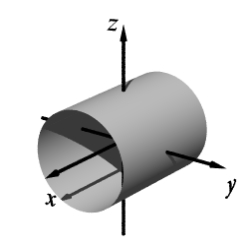
B)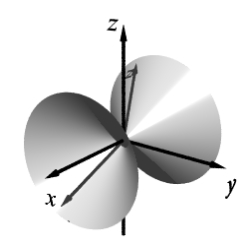
C)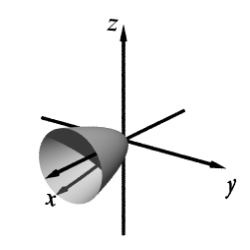
D)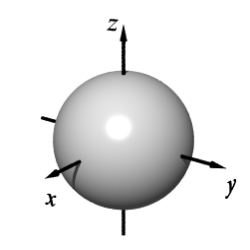
A)

B)

C)

D)


فتح الحزمة
افتح القفل للوصول البطاقات البالغ عددها 137 في هذه المجموعة.
فتح الحزمة
k this deck
27
Find the mass of the surface S having the given mass density. S is part of the plane in the first octant; the density at a point P on S is equal to the square of the distance between P and the xy-plane.
A)
B)
C) 49
D) 20
A)
B)
C) 49
D) 20

فتح الحزمة
افتح القفل للوصول البطاقات البالغ عددها 137 في هذه المجموعة.
فتح الحزمة
k this deck
28
Find the area of the part of the cone that is cut off by the cylinder
A)
B)
C)
D)
A)
B)
C)
D)

فتح الحزمة
افتح القفل للوصول البطاقات البالغ عددها 137 في هذه المجموعة.
فتح الحزمة
k this deck
29
Evaluate . ; S is the part of the torus with vector representation , , .
A) 0
B)
C)
D)
A) 0
B)
C)
D)

فتح الحزمة
افتح القفل للوصول البطاقات البالغ عددها 137 في هذه المجموعة.
فتح الحزمة
k this deck
30
Evaluate  , that is, find the flux of F across S.
, that is, find the flux of F across S.  ; S is the part of the paraboloid
; S is the part of the paraboloid  between the planes z = 0 and z = 5; n points upward.
between the planes z = 0 and z = 5; n points upward.
 , that is, find the flux of F across S.
, that is, find the flux of F across S.  ; S is the part of the paraboloid
; S is the part of the paraboloid  between the planes z = 0 and z = 5; n points upward.
between the planes z = 0 and z = 5; n points upward.
فتح الحزمة
افتح القفل للوصول البطاقات البالغ عددها 137 في هذه المجموعة.
فتح الحزمة
k this deck
31
A fluid with density  flows with velocity
flows with velocity  Find the rate of flow upward through the paraboloid
Find the rate of flow upward through the paraboloid 
 flows with velocity
flows with velocity  Find the rate of flow upward through the paraboloid
Find the rate of flow upward through the paraboloid 

فتح الحزمة
افتح القفل للوصول البطاقات البالغ عددها 137 في هذه المجموعة.
فتح الحزمة
k this deck
32
Use Gauss's Law to find the charge contained in the solid hemisphere  , if the electric field is
, if the electric field is 
 , if the electric field is
, if the electric field is 

فتح الحزمة
افتح القفل للوصول البطاقات البالغ عددها 137 في هذه المجموعة.
فتح الحزمة
k this deck
33
Find the moment of inertia about the z-axis of a thin funnel in the shape of a cone  if its density function is
if its density function is 
 if its density function is
if its density function is 

فتح الحزمة
افتح القفل للوصول البطاقات البالغ عددها 137 في هذه المجموعة.
فتح الحزمة
k this deck
34
Evaluate . ; S is the part of the cone between the planes and .
A)
B)
C)
D) 0
A)
B)
C)
D) 0

فتح الحزمة
افتح القفل للوصول البطاقات البالغ عددها 137 في هذه المجموعة.
فتح الحزمة
k this deck
35
Find the area of the surface. The part of the plane ; ,
A)
B)
C)
D)
A)
B)
C)
D)

فتح الحزمة
افتح القفل للوصول البطاقات البالغ عددها 137 في هذه المجموعة.
فتح الحزمة
k this deck
36
Evaluate the surface integral where S is the surface with parametric equations , .
A)
B)
C)
D)
E)
A)
B)
C)
D)
E)

فتح الحزمة
افتح القفل للوصول البطاقات البالغ عددها 137 في هذه المجموعة.
فتح الحزمة
k this deck
37
Evaluate the surface integral. S is the part of the cylinder  between the planes
between the planes  and
and  in the first octant.
in the first octant. 
 between the planes
between the planes  and
and  in the first octant.
in the first octant. 

فتح الحزمة
افتح القفل للوصول البطاقات البالغ عددها 137 في هذه المجموعة.
فتح الحزمة
k this deck
38
Evaluate , that is, find the flux of F across S. ; S is the hemisphere ; n points upward.
A)
B) 162
C)
D) 162
A)
B) 162
C)
D) 162

فتح الحزمة
افتح القفل للوصول البطاقات البالغ عددها 137 في هذه المجموعة.
فتح الحزمة
k this deck
39
Let S be the cube with vertices . Approximate by using a Riemann sum as in Definition 1, taking the patches to be the squares that are the faces of the cube and the points to be the centers of the squares.
A)
B)
C)
D)
E) none of these
A)
B)
C)
D)
E) none of these

فتح الحزمة
افتح القفل للوصول البطاقات البالغ عددها 137 في هذه المجموعة.
فتح الحزمة
k this deck
40
Find the area of the surface. The part of the paraboloid ; ,
A)
B)
C)
D)
A)
B)
C)
D)

فتح الحزمة
افتح القفل للوصول البطاقات البالغ عددها 137 في هذه المجموعة.
فتح الحزمة
k this deck
41
Find the area of the surface S where S is the part of the sphere  that lies inside the cylinder
that lies inside the cylinder 
 that lies inside the cylinder
that lies inside the cylinder 

فتح الحزمة
افتح القفل للوصول البطاقات البالغ عددها 137 في هذه المجموعة.
فتح الحزمة
k this deck
42
Find the correct identity, if f is a scalar field, F and G are vector fields.
A)
B)
C)
D) None of these
A)
B)
C)
D) None of these

فتح الحزمة
افتح القفل للوصول البطاقات البالغ عددها 137 في هذه المجموعة.
فتح الحزمة
k this deck
43
Find an equation of the tangent plane to the parametric surface represented by r at the specified point.  ;
; 
 ;
; 

فتح الحزمة
افتح القفل للوصول البطاقات البالغ عددها 137 في هذه المجموعة.
فتح الحزمة
k this deck
44
Find the area of the surface S where S is the part of the plane  that lies above the triangular region with vertices
that lies above the triangular region with vertices 
 , and
, and 
 that lies above the triangular region with vertices
that lies above the triangular region with vertices 
 , and
, and 

فتح الحزمة
افتح القفل للوصول البطاقات البالغ عددها 137 في هذه المجموعة.
فتح الحزمة
k this deck
45
Use the Divergence Theorem to find the flux of F across S; that is, calculate  .
.  ; S is the sphere
; S is the sphere 
 .
.  ; S is the sphere
; S is the sphere 

فتح الحزمة
افتح القفل للوصول البطاقات البالغ عددها 137 في هذه المجموعة.
فتح الحزمة
k this deck
46
Find a parametric representation for the part of the sphere  that lies above the cone
that lies above the cone 
 that lies above the cone
that lies above the cone 

فتح الحزمة
افتح القفل للوصول البطاقات البالغ عددها 137 في هذه المجموعة.
فتح الحزمة
k this deck
47
Find the area of the part of paraboloid  that lies inside the cylinder
that lies inside the cylinder 
 that lies inside the cylinder
that lies inside the cylinder 

فتح الحزمة
افتح القفل للوصول البطاقات البالغ عددها 137 في هذه المجموعة.
فتح الحزمة
k this deck
48
Find an equation in rectangular coordinates, and then identify the surface. 


فتح الحزمة
افتح القفل للوصول البطاقات البالغ عددها 137 في هذه المجموعة.
فتح الحزمة
k this deck
49
Find an equation in rectangular coordinates, and then identify the surface. 


فتح الحزمة
افتح القفل للوصول البطاقات البالغ عددها 137 في هذه المجموعة.
فتح الحزمة
k this deck
50
Set up, but do not evaluate, a double integral for the area of the surface with parametric equations 


فتح الحزمة
افتح القفل للوصول البطاقات البالغ عددها 137 في هذه المجموعة.
فتح الحزمة
k this deck
51
Find a parametric representation for the part of the plane  that lies inside the cylinder
that lies inside the cylinder 
 that lies inside the cylinder
that lies inside the cylinder 

فتح الحزمة
افتح القفل للوصول البطاقات البالغ عددها 137 في هذه المجموعة.
فتح الحزمة
k this deck
52
Find an equation of the tangent plane to the parametric surface represented by r at the specified point.  ; u = ln 5, v = 0
; u = ln 5, v = 0
 ; u = ln 5, v = 0
; u = ln 5, v = 0
فتح الحزمة
افتح القفل للوصول البطاقات البالغ عددها 137 في هذه المجموعة.
فتح الحزمة
k this deck
53
Find the area of the surface S where S is the part of the sphere  that lies to the right of the xz-plane and inside the cylinder
that lies to the right of the xz-plane and inside the cylinder 
 that lies to the right of the xz-plane and inside the cylinder
that lies to the right of the xz-plane and inside the cylinder 

فتح الحزمة
افتح القفل للوصول البطاقات البالغ عددها 137 في هذه المجموعة.
فتح الحزمة
k this deck
54
Below is given the plot of a vector field F in the xy-plane. (The z-component of F is 0.) By studying the plot, determine whether div F is positive, negative, or zero. 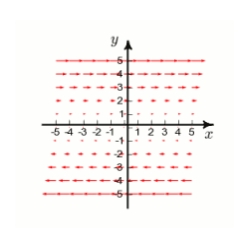
A) cannot be determined
B) positive
C) negative
D) zero

A) cannot be determined
B) positive
C) negative
D) zero

فتح الحزمة
افتح القفل للوصول البطاقات البالغ عددها 137 في هذه المجموعة.
فتح الحزمة
k this deck
55
Find the area of the surface S where S is the part of the surface  that lies inside the cylinder
that lies inside the cylinder 
 that lies inside the cylinder
that lies inside the cylinder 

فتح الحزمة
افتح القفل للوصول البطاقات البالغ عددها 137 في هذه المجموعة.
فتح الحزمة
k this deck
56
Find the area of the part of the surface that lies between the planes x = 0, x = 4, , and z = 1.
A)
B)
C)
D)
E)
A)
B)
C)
D)
E)

فتح الحزمة
افتح القفل للوصول البطاقات البالغ عددها 137 في هذه المجموعة.
فتح الحزمة
k this deck
57
Let
A) 9
B) 45
C) 18
D) 27
E) None of these
A) 9
B) 45
C) 18
D) 27
E) None of these

فتح الحزمة
افتح القفل للوصول البطاقات البالغ عددها 137 في هذه المجموعة.
فتح الحزمة
k this deck
58
Find an equation of the tangent plane to the parametric surface represented by r at the specified point.  ; u = ln 9, v = 0
; u = ln 9, v = 0
 ; u = ln 9, v = 0
; u = ln 9, v = 0
فتح الحزمة
افتح القفل للوصول البطاقات البالغ عددها 137 في هذه المجموعة.
فتح الحزمة
k this deck
59
Find a vector representation for the surface.
The plane that passes through the point and contains the vectors
and contains the vectors  and
and  ..
..
The plane that passes through the point
 and contains the vectors
and contains the vectors  and
and  ..
..
فتح الحزمة
افتح القفل للوصول البطاقات البالغ عددها 137 في هذه المجموعة.
فتح الحزمة
k this deck
60
Find the divergence of the vector field F.
A)
B)
C)
D)
A)
B)
C)
D)

فتح الحزمة
افتح القفل للوصول البطاقات البالغ عددها 137 في هذه المجموعة.
فتح الحزمة
k this deck
61
Determine whether or not vector field is conservative. If it is conservative, find a function f such that 




فتح الحزمة
افتح القفل للوصول البطاقات البالغ عددها 137 في هذه المجموعة.
فتح الحزمة
k this deck
62
Use Green's Theorem and/or a computer algebra system to evaluate where C is the circle with counterclockwise orientation.
A)
B)
C)
D)
E) None of these
A)
B)
C)
D)
E) None of these

فتح الحزمة
افتح القفل للوصول البطاقات البالغ عددها 137 في هذه المجموعة.
فتح الحزمة
k this deck
63
Let f be a scalar field. Determine whether the expression is meaningful. If so, state whether the expression represents a scalar field or a vector field. 


فتح الحزمة
افتح القفل للوصول البطاقات البالغ عددها 137 في هذه المجموعة.
فتح الحزمة
k this deck
64
Let D be a region bounded by a simple closed path C in the xy. Then the coordinates of the centroid where A is the area of D. Find the centroid of the triangle with vertices (0, 0), ( , 0) and (0, ).
A)
B)
C)
D)
E)
A)
B)
C)
D)
E)

فتح الحزمة
افتح القفل للوصول البطاقات البالغ عددها 137 في هذه المجموعة.
فتح الحزمة
k this deck
65
Find the curl of  .
.
 .
.
فتح الحزمة
افتح القفل للوصول البطاقات البالغ عددها 137 في هذه المجموعة.
فتح الحزمة
k this deck
66
Determine whether or not vector field is conservative. If it is conservative, find a function f such that 




فتح الحزمة
افتح القفل للوصول البطاقات البالغ عددها 137 في هذه المجموعة.
فتح الحزمة
k this deck
67
Let F be a vector field. Determine whether the expression is meaningful. If so, state whether the expression represents a scalar field or a vector field. 


فتح الحزمة
افتح القفل للوصول البطاقات البالغ عددها 137 في هذه المجموعة.
فتح الحزمة
k this deck
68
Find (a) the divergence and (b) the curl of the vector field F. 


فتح الحزمة
افتح القفل للوصول البطاقات البالغ عددها 137 في هذه المجموعة.
فتح الحزمة
k this deck
69
Use Green's Theorem to evaluate the line integral along the positively oriented closed curve C. , where C is the boundary of the region bounded by the parabolas and .
A) + e
B) + e
C)
D)
A) + e
B) + e
C)
D)

فتح الحزمة
افتح القفل للوصول البطاقات البالغ عددها 137 في هذه المجموعة.
فتح الحزمة
k this deck
70
Let 




فتح الحزمة
افتح القفل للوصول البطاقات البالغ عددها 137 في هذه المجموعة.
فتح الحزمة
k this deck
71
Find the div F if  .
.
 .
.
فتح الحزمة
افتح القفل للوصول البطاقات البالغ عددها 137 في هذه المجموعة.
فتح الحزمة
k this deck
72
Find the curl of the vector field.
A)
B)
C)
D)
E) None of these
A)
B)
C)
D)
E) None of these

فتح الحزمة
افتح القفل للوصول البطاقات البالغ عددها 137 في هذه المجموعة.
فتح الحزمة
k this deck
73
Let f be a scalar field. Determine whether the expression is meaningful. If so, state whether the expression represents a scalar field or a vector field.
curl f
curl f

فتح الحزمة
افتح القفل للوصول البطاقات البالغ عددها 137 في هذه المجموعة.
فتح الحزمة
k this deck
74
Find the curl of the vector field. 


فتح الحزمة
افتح القفل للوصول البطاقات البالغ عددها 137 في هذه المجموعة.
فتح الحزمة
k this deck
75
Find the curl of the vector field. 


فتح الحزمة
افتح القفل للوصول البطاقات البالغ عددها 137 في هذه المجموعة.
فتح الحزمة
k this deck
76
Let F be a vector field. Determine whether the expression is meaningful. If so, state whether the expression represents a scalar field or a vector field.
curl (div F)
curl (div F)

فتح الحزمة
افتح القفل للوصول البطاقات البالغ عددها 137 في هذه المجموعة.
فتح الحزمة
k this deck
77
Let 




فتح الحزمة
افتح القفل للوصول البطاقات البالغ عددها 137 في هذه المجموعة.
فتح الحزمة
k this deck
78
Use Green's Theorem to evaluate the line integral along the positively oriented closed curve C. , where C is the triangle with vertices , , and .
A)
B)
C)
D)
A)
B)
C)
D)

فتح الحزمة
افتح القفل للوصول البطاقات البالغ عددها 137 في هذه المجموعة.
فتح الحزمة
k this deck
79
Find the divergence of the vector field. 


فتح الحزمة
افتح القفل للوصول البطاقات البالغ عددها 137 في هذه المجموعة.
فتح الحزمة
k this deck
80
Find the curl of the vector field F.
A)
B)
C)
D)
A)
B)
C)
D)

فتح الحزمة
افتح القفل للوصول البطاقات البالغ عددها 137 في هذه المجموعة.
فتح الحزمة
k this deck








